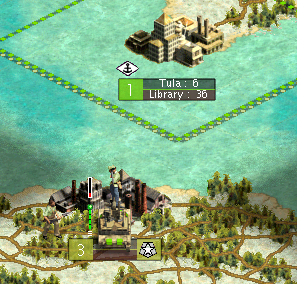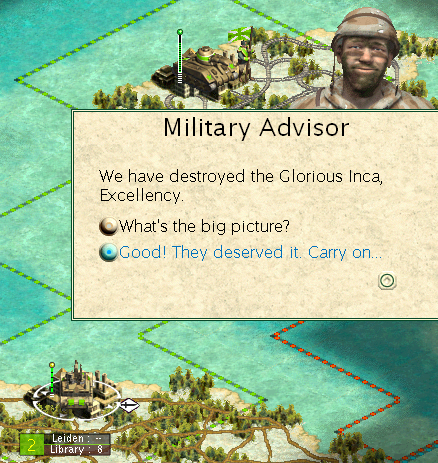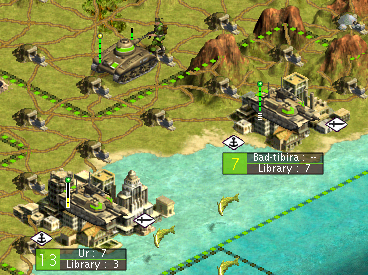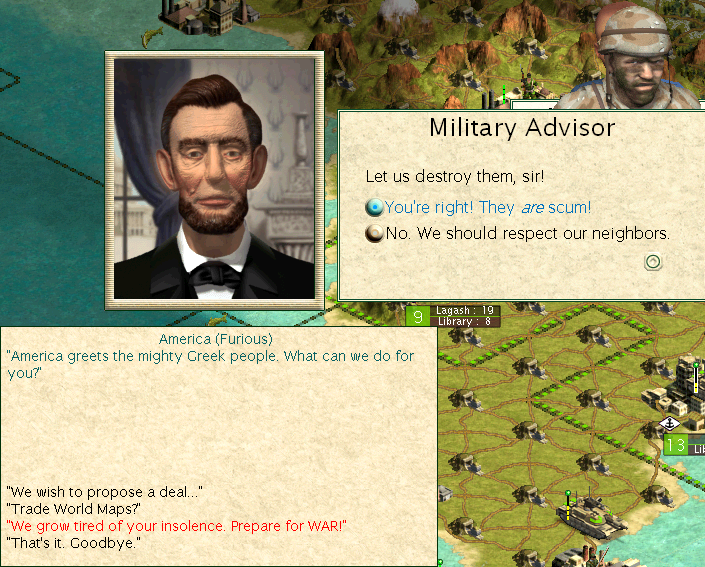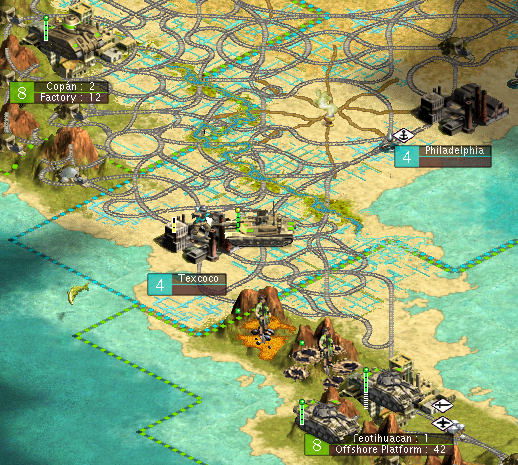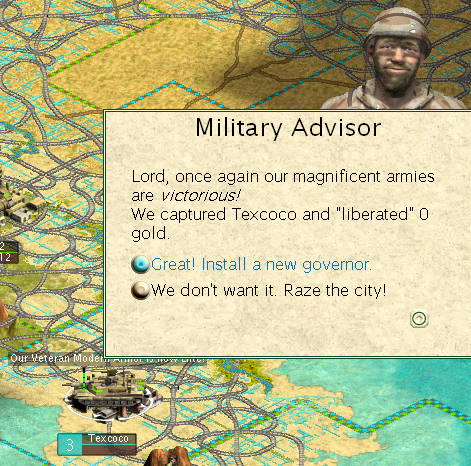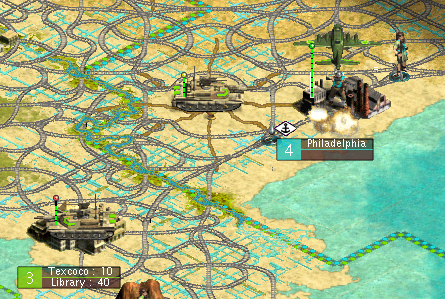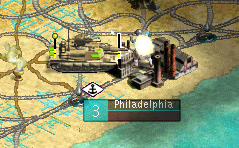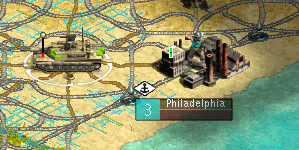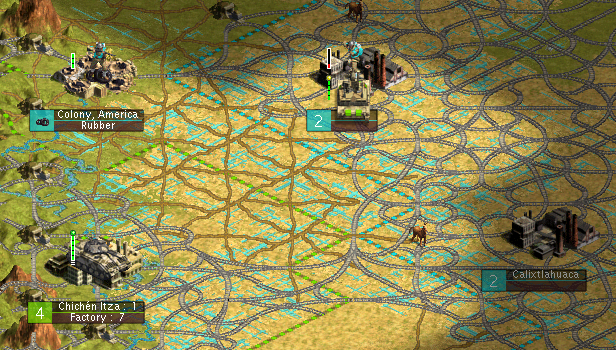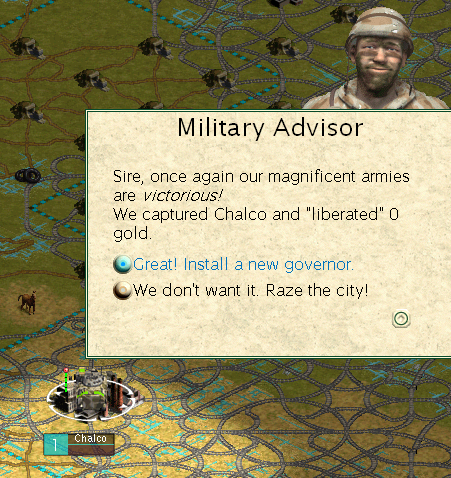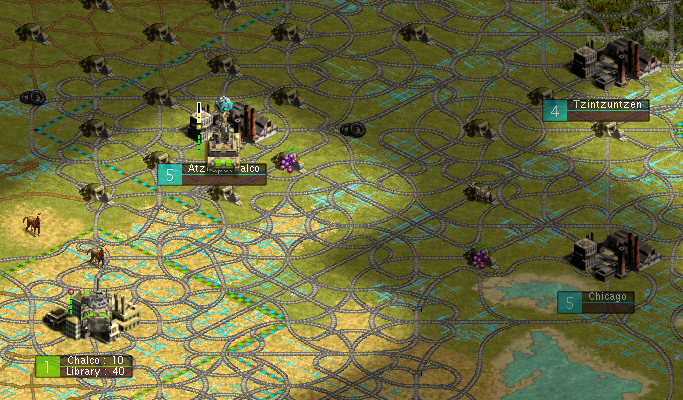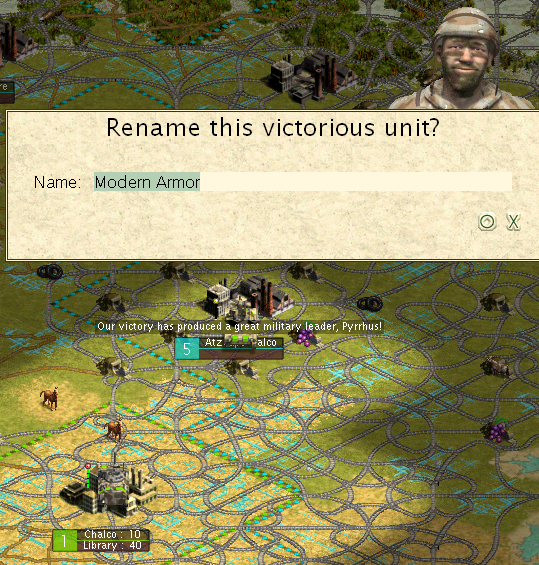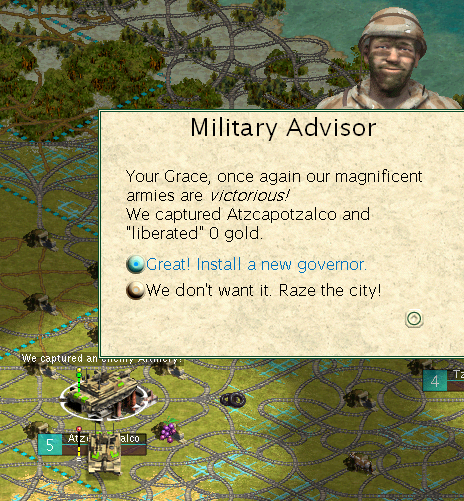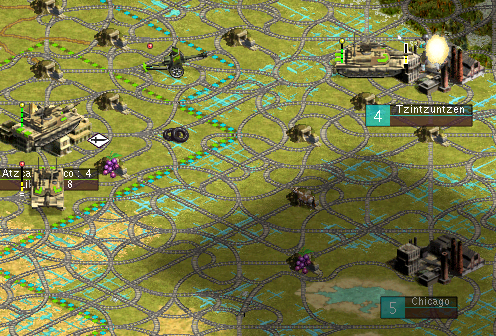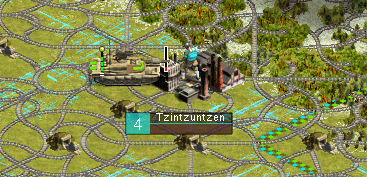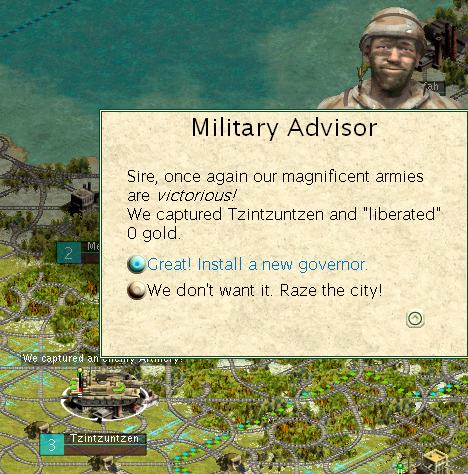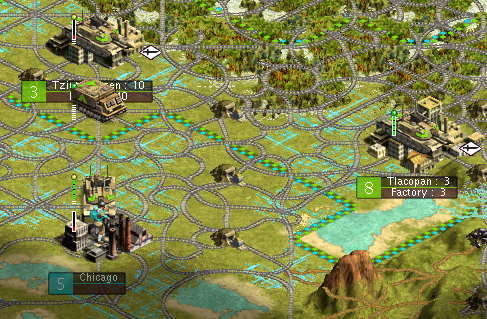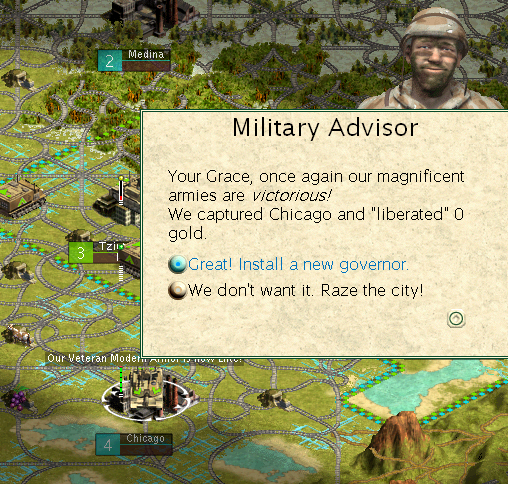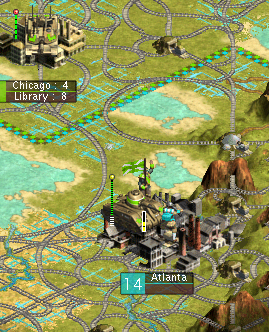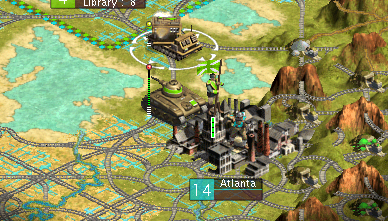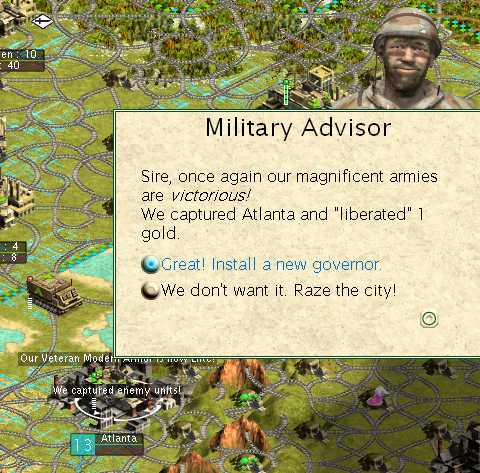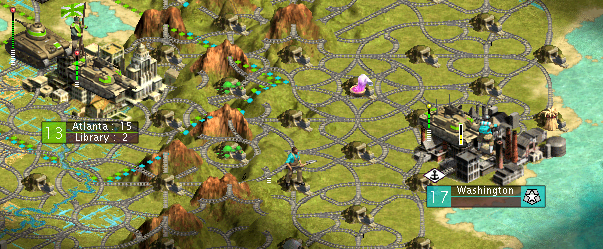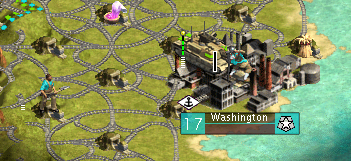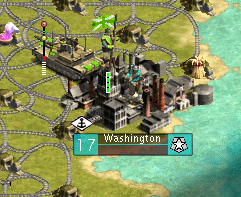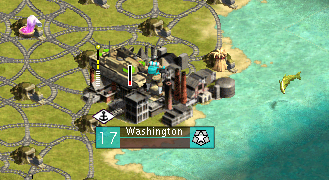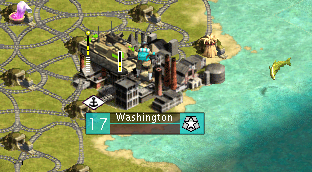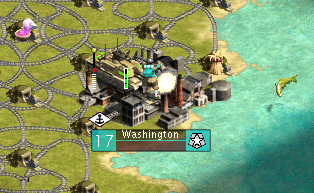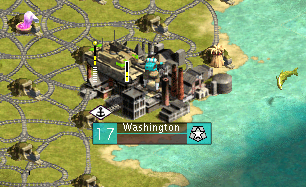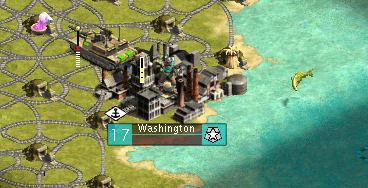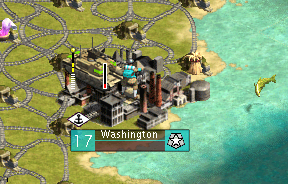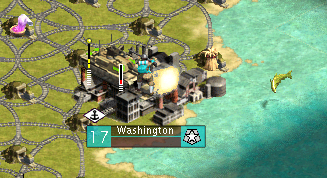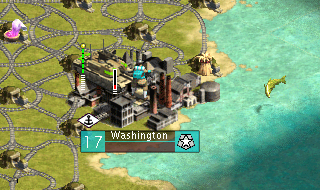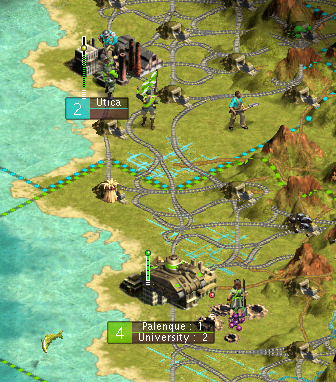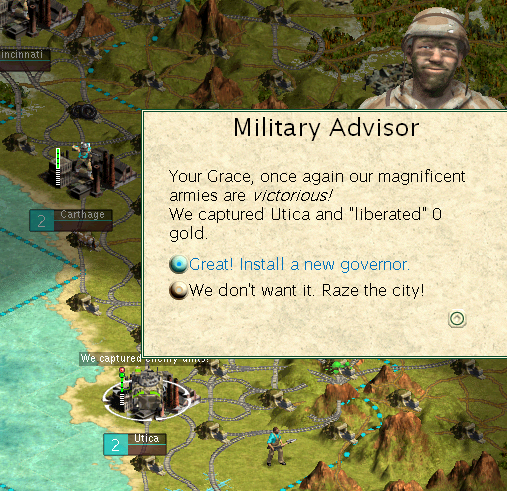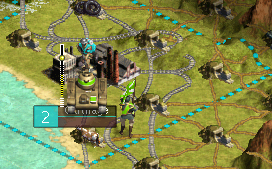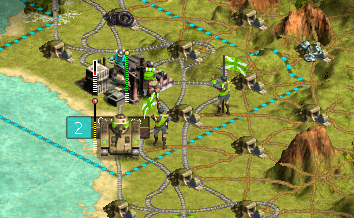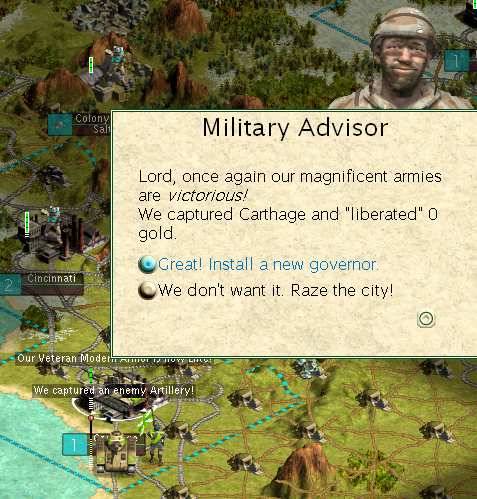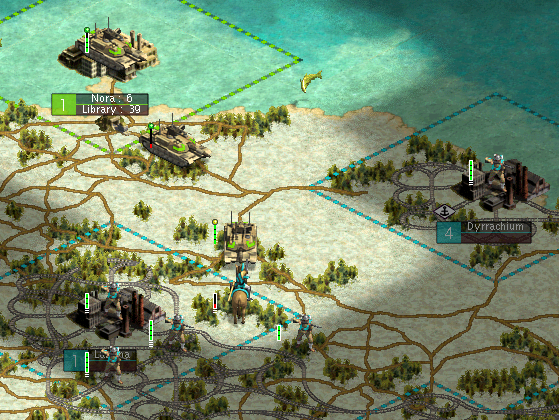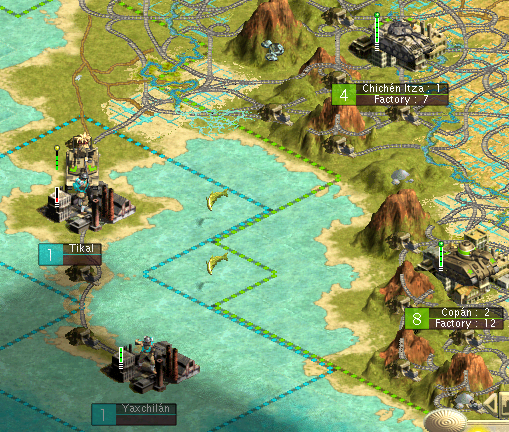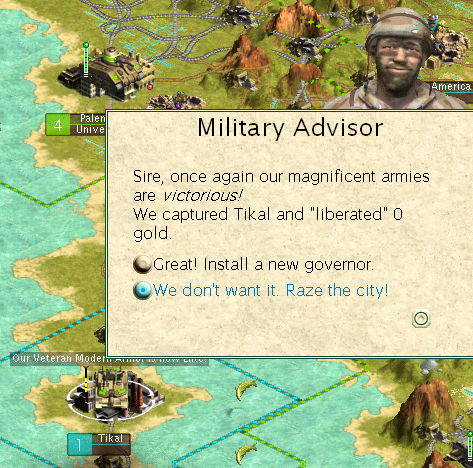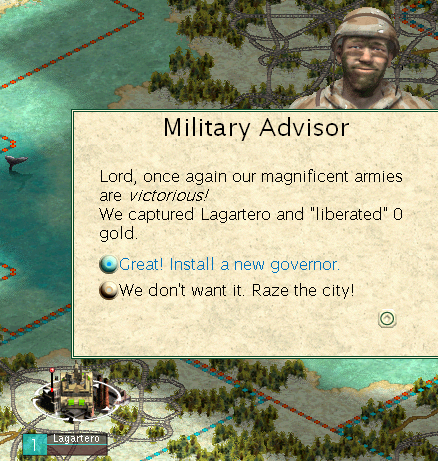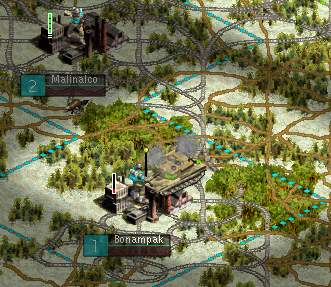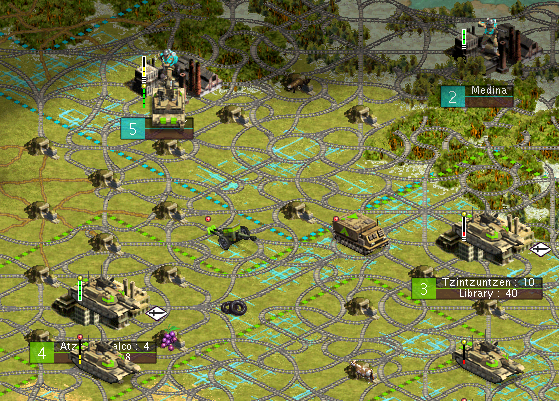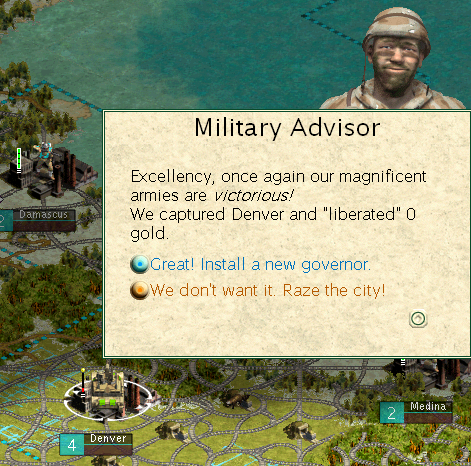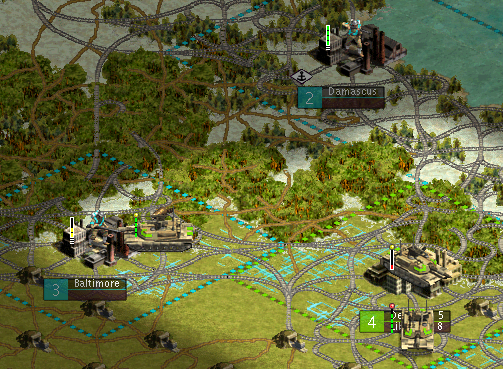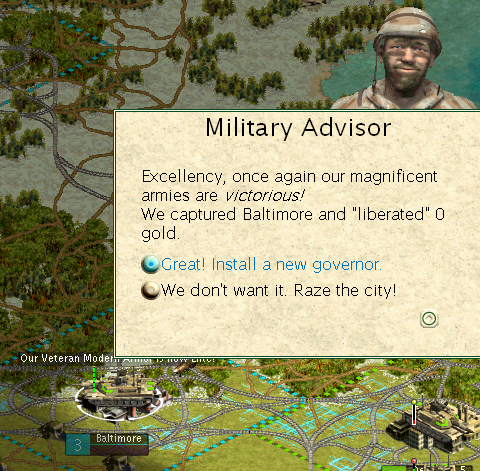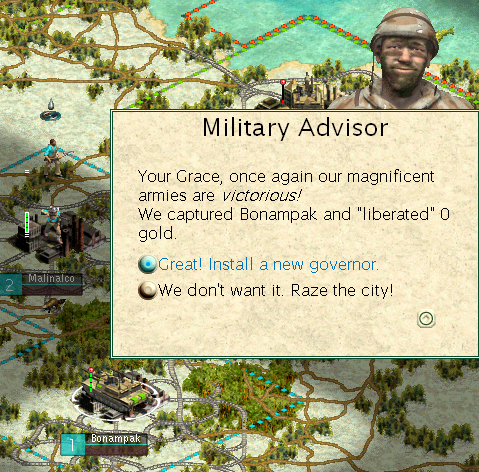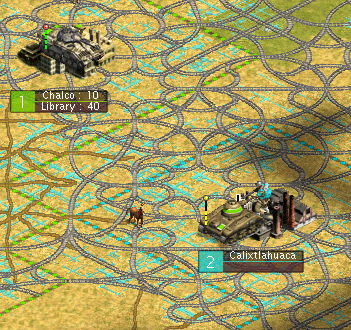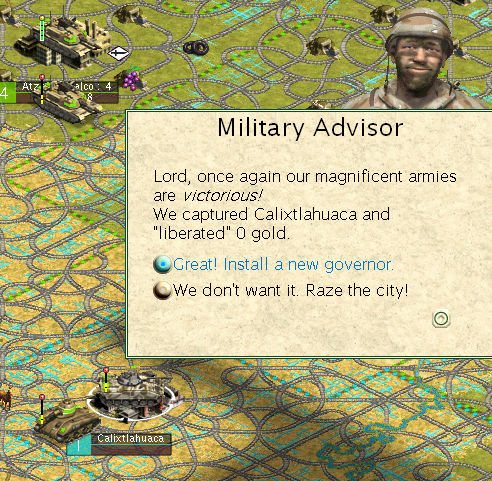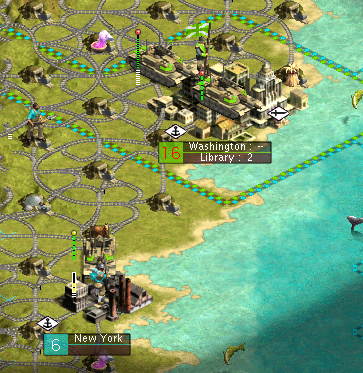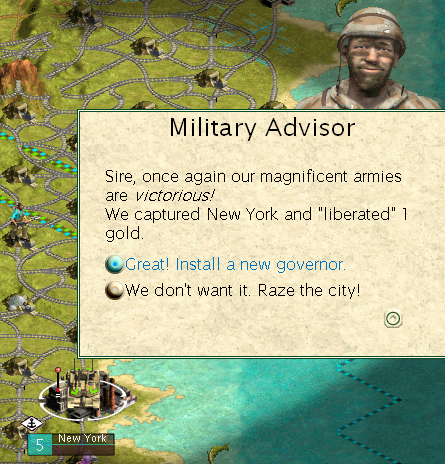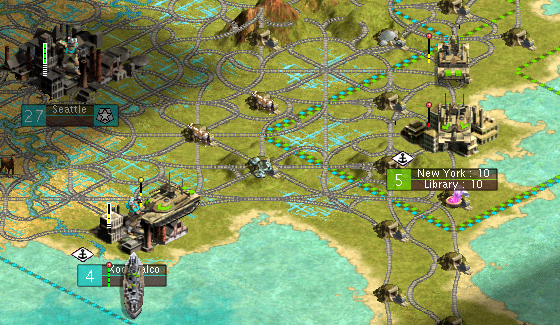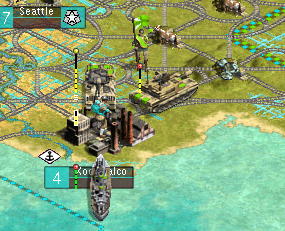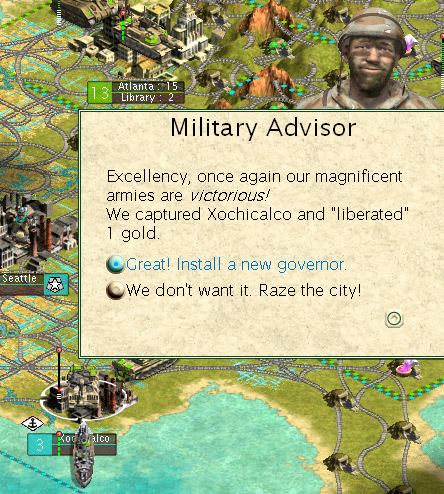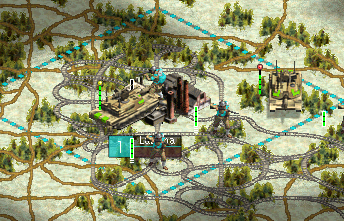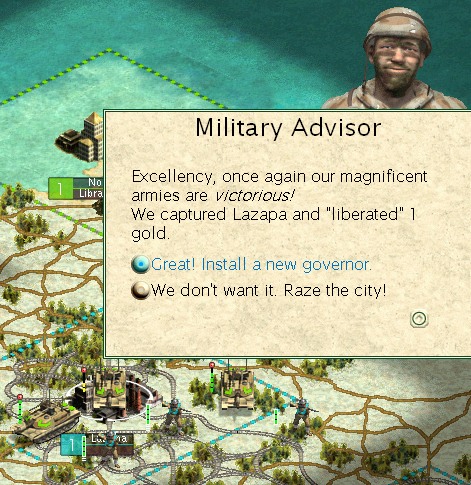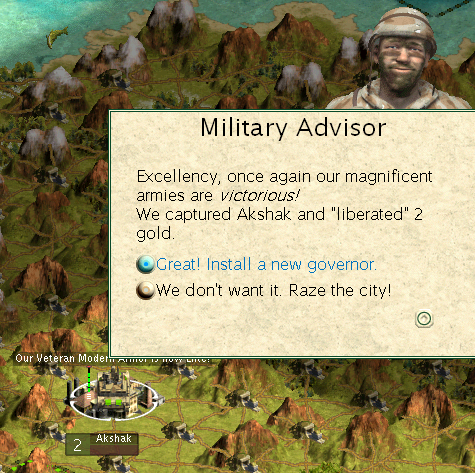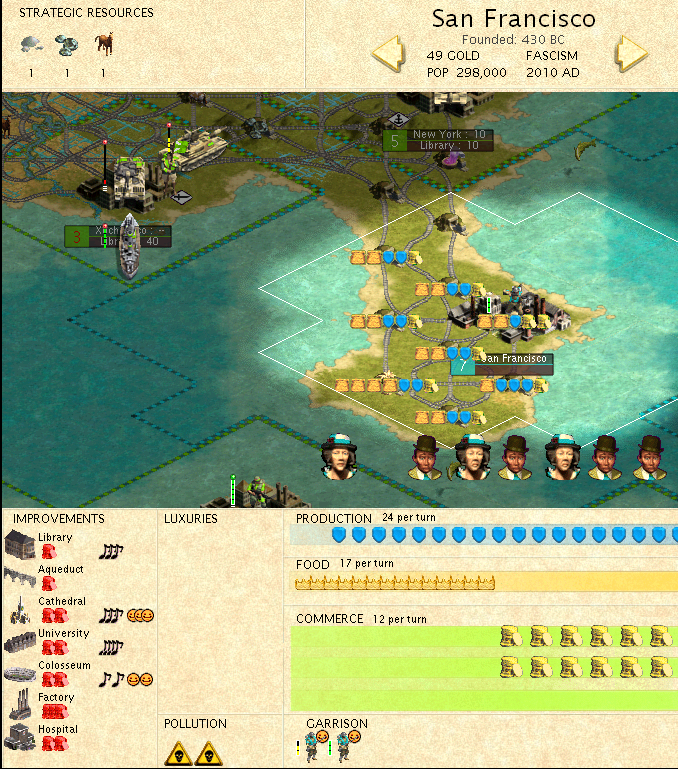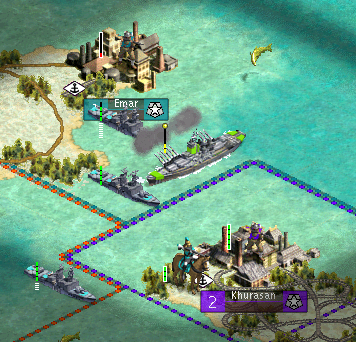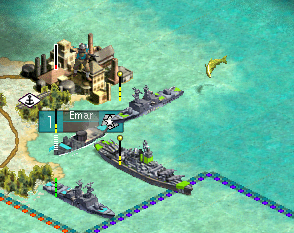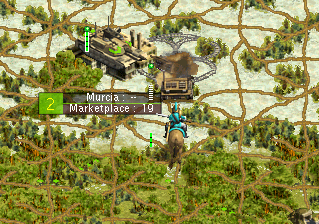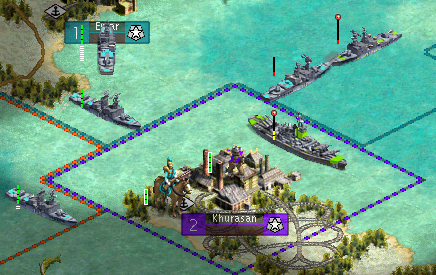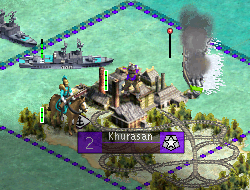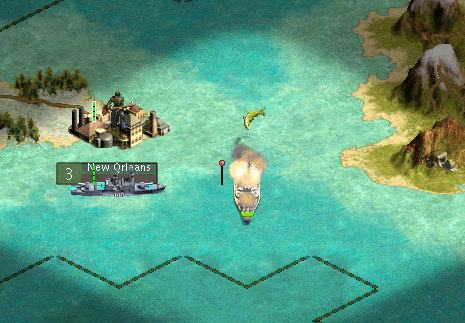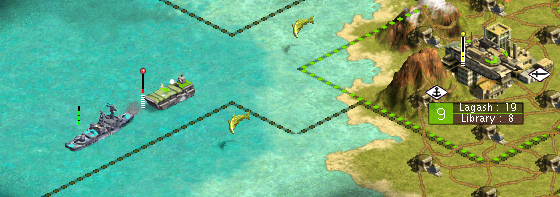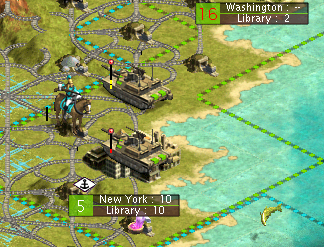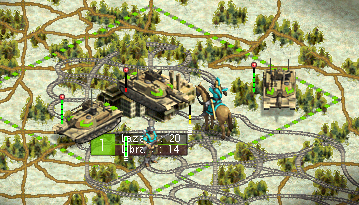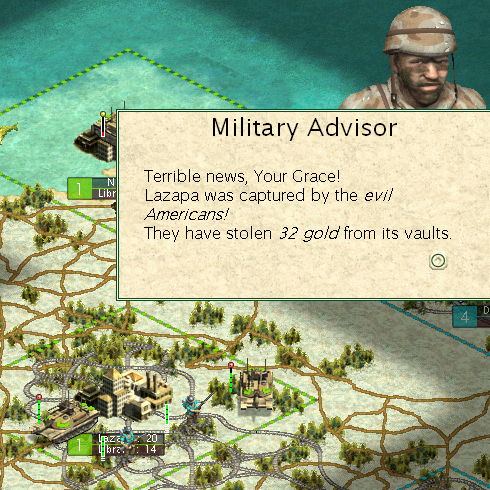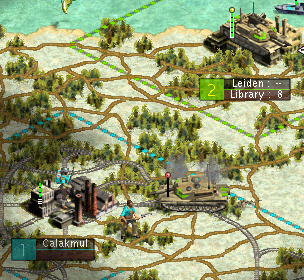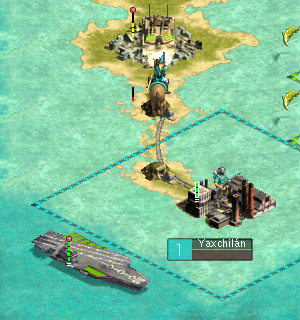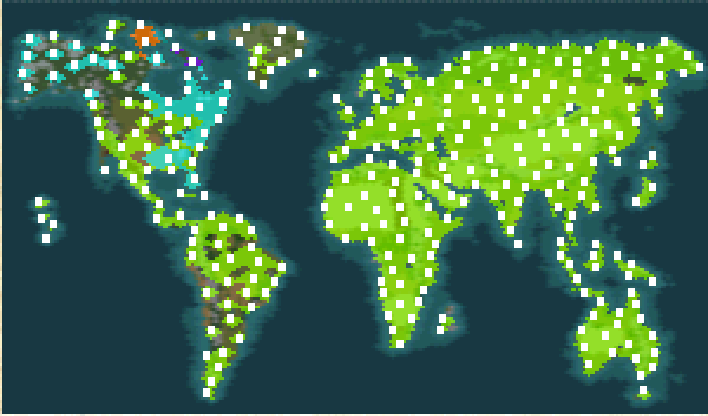The city of Atlanta was one of the most important in the American Empire, south of Lake Erie and drawing resources from all around. Producing sixty shields per turn, it was one of the most consistent production cities around, and was heavily garrisoned in accordance, sporting four Infantry and two Artillery in defence, in addition to a Cavalry unit waiting for orders. Currently it was working on the first of America's newest, strongest units - Marines - to enter the service to help defender the homeland.
Thus it was with great frusteration that Emperor Collins received the news of an approaching Army. "Not a step back!" he ordered. "Project 'M' must be saved at all costs!" The attackers, it was reported, were of an older generation than the previous attackers America had faced, but were still more than tough enough for America.
They proved just as rugged as their more advanced counterparts, and the first quarter of the defending Infantry fell without too much trouble. The American military command hoped they would not face another Army, but it was not their lucky year. They wouldn't face another Army in Atlanta, but they would face a Radar Artillery barrage.
By the time the barrage was over, the Americans would have been just as well off with Conscript defenders. Even their metropolitan advantage couldn't slow down the Greek Modern Armor advance.
Emperor Collins was enraged, but it wasn't so much the loss of Atlanta itself that angered him. Washington itself was now in danger, and Seattle, the largest city in the world, was as well. Riots were occuring across America, the citizens furious that the imperial government that had promised to protect them better than a Democracy - and indeed had had decent success prior to 2010 - was disintegrating so quickly in the face of the Greek advance.
*****
June, 2010. The year had been disasterous for America, and now Greek troops were storming down the north shore of the Potomoc towards Washington. The Imperial Palace was right down their path - and America seemed helpless to save its capital. Six Infantry guarded Washington, but America's record so far had been abysmal - could six Infantry really hold the city? In previous wars in North America that had seemed a nearly inpenetrable force, but it hadn't done very much to stop Greece this year.
The first Infantry met the Modern Armor head-on outside of Gathersburg, Maryland. The Americans were determined to spare the District of Colombia from any harm if at all possible, and fought with all their might and valor to stave off the enemy - and succeeded. One Modern Armor was down, countless more remained.
The next Modern Armor fared much better, and Gaithersburg fell. Advancing down I-270, the Modern Armor met the next group of resistance at Rockville. Frantic civilians jumped on the last Metro train to downtown as the combat began.
The citizens of Rockville were fortunate that day, and little damage was dealt to their neighborhood as the Modern Armor were thoroughly defeated. But the two days later Greece sent another group to the same area.
This time the Greeks proved dominant, and the affluent suburb was strewn with rubble by the end of the fight. As the fight moved forwards, the sounds of war were heard throughout the District of Colombia. Suddenly a visit to the Museum of American History was no longer desirable. Celebrating triumphs over the Maya and Carthaginians just didn't have the same appeal with the Greeks twenty miles away. The mood within the city became unusually quiet. The government tried to make everything appear as usual, but with the distinct lack of casual conversation and the military convoys making up half the traffic on the roadways, "everything as usual" was obviously not happening.
Bethesda was America's last effort to stop the Greeks outside the District. A desperate campaign was waged, taking advantage of every building and bridge to slow down the Greeks.
Once again, the Greeks were forced to retreat, but the next day Greece was back, with its sixth attack on the District defences in a week. America's troops - and the local residents - were becoming weary, and Greece seemed to have an inexhaustible supply of fresh soldiers.
Still America's army fought impressively, and destroyed the Modern Armor making the second attack on Bethesda. Scared citizens watched across America as the fate of their nation rested on the balance, but thanks in part to the experience of the government news spin team, some small hope remained for the American citizens.
The third day of the attack proved too much for the American defenders, and, in a battle lasting into the twilight, America's troops were at last forced to give up Maryland. The Emperor called an emergency Cabinet session to decide on a path of action. Unable to fathom abandoning defences with fourth-fifths of his army intact, he at last decided to order troops to attempt to hold off the Greeks in the outer parts of the District of Colombia. The government would stay another day.
At the end of the next day, the Emperor was being congratulated on his decision. The Greeks had performed most poorly in their first foray into America's capital, and had been repulsed with minimal damage. Yet still the nation waited with bated breath, for, even though they had won a victory, precious little protected their capital form capture.
The next day proved just that, as determined Greeks overwhelmed American defenders to gain a steady foothold in the District of Colombia. They made camp only a few hundred meters from the Imperial Palace and the Capitol, and a tense darkness settled on the city. Trains were leaving stations for Richmond and Annapolis every few minutes, and a steady stream of exiting carriages clogged the streets. Snipers lined the roof of the U.S. Capitol, daring the Greeks to advance. And that they did, at five o'clock the next morning, just as the sun began to rise.
Emperor Collins awoke to the sound of a shell slamming into a building a hundred meters away, and knew his days in the Imperial Palace were done. Hurrying through the Palace grabbing a few items on his way to the stables, he barked orders to protect the Intelligence Agency if all else must fall.
"Emperor! Which of the military plans do you want?" yelled his aid as he walked by.
"Never mind those, we have to get out of here before we're dead!" he replied. "If they kill us America will fall into anarchy, we're the only hope!"
Five minutes later his horse was sprinting south towards Seattle, just ahead of the advancing Greek troops.
The battle was spirited, with Greek troops shouting triumphantly at every advance and American troops refusing to surrender a single point in the city. Many buildings were left damaged by stray shells, and the Capitol suffered countless bullet holes from Greek efforts to eliminate the snipers. But Greece once again proved triumphant, and Washington fell.
As the Greeks sorted out the remains of the city that evening, a Private happened upon some papers in the Imperial Palace that appeared to give the positions of all of America's troops. He hurried to an officer with the papers crinkling as he ran.
"Whoa, slow down, what is it?" asked the officer.
"Sir...I think...these...show where all...America's troops are," panted the soldier.
"Give them here, let me see..." said the officer, thinking the private was surely deluded. But the positions did seem likely, and in the end he decided to forward them on to headquarters. In a few hours both were looking at a nice promotion. Greece now had America's exact troop positions, down to the last Pikeman in Oea.
But before any other cities were targeted, the Intelligence Agency had to be taken, and any American efforts at counterespionage ended.
The battle was easy, the Americans exhausted and demoralized. Even the most skeptical had at least hoped Washington would survive any sudden Greek invasion, yet it had fallen already. True, America still had 84 of its 106 Infantry, but nine cities, including two of their three metropolises, had already fallen.
The Americans expected the Greeks to continue along the East Seaboard, or perhaps to Seattle, defeating American production centers once and for all. But it was along the West Coast that Greek Marines next attacked.
The sensitive information gleaned in Washington had told Greek commanders exactly where the American Cavalry were, the only real danger America posed, and most were in Carthage. Thus the next attacks had to move there.
Cathage was, in fact, one of the best-defended cities in America. Four Cavalry, five Infantry, and an Artillery guarded it - a seemingly inexplicably high garrison.
The Infantry destroyed one Modern Armor but on the whole fell easily, and three Modern Armor had little trouble destroying the Cavalry to take the city.
Greece then targeted two unprotected American Cavalry in Alaska.
The battle is an easy victory. Turning south, Tikal, in Baja California, is attacked.
 .
.
![Party [party] [party]](/images/smilies/partytime.gif)

